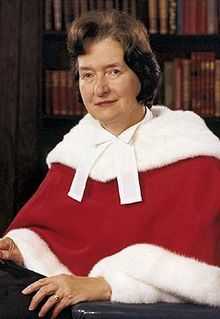Bertha Wilson
| Bertha Wilson | |
|---|---|
 | |
| Puisne Justice of the Supreme Court of Canada | |
| In office March 4, 1982 – January 4, 1991 | |
| Nominated by | Pierre Trudeau |
| Preceded by | Ronald Martland |
| Succeeded by | Frank Iacobucci |
| Personal details | |
| Born | Bertha Wernham September 18, 1923 Kirkcaldy, Scotland |
| Died | April 28, 2007 (aged 83) Ottawa, Ontario |
| Spouse(s) | Rev. John Wilson |
Bertha Wernham Wilson, CC (September 18, 1923, Kirkcaldy, Fife, Scotland – April 28, 2007, Ottawa, Ontario, Canada) was a Canadian jurist and the first female Puisne Justice of the Supreme Court of Canada.
Early life
Born in Kirkcaldy, Fife, Scotland, the daughter of Archibald Wernham and Christina Noble, she received a Master of Arts degree in philosophy from University of Aberdeen in 1944. In 1949 Wilson emigrated to Canada with her husband, the Reverend John Wilson, whom she had married in 1945.
Professional career
She received a Bachelor of Laws degree from Dalhousie University and was called to the Nova Scotia Bar in 1957. She moved to Toronto in 1959, was called to the Ontario Bar and joined the firm of Osler, Hoskin & Harcourt. She became a partner in 1968.
She was the first woman appointed to the Court of Appeal for Ontario in 1975. In 1982, she became the first woman appointed to the Supreme Court of Canada, by Pierre Trudeau. Wilson retired from the court in 1991 and was made a Companion of the Order of Canada and a Fellow of the Royal Society of Canada that same year.
Wilson's Supreme Court rulings include: R. v. Morgentaler in 1988 (abortion procedures), R. v Lavallée in 1990 (battered-wife syndrome as self-defense), Operation Dismantle v. The Queen in 1985 (judicial review), the minority decision in R. v. Stevens (1988) which was adopted later in R. v. Hess; R. v. Nguyen in 1990 (mens rea and statutory rape), Kosmopolous v. Constitution Insurance Co. of Canada (piercing "corporate veil"), the dissenting opinion in McKinney v. University of Guelph in 1990 (mandatory retirement), Andrews v. Law Society of British Columbia in 1989 (equality rights test), and Sobeys Stores v. Yeomans and Labour Standards Tribunal (NS) in 1989 (interpretive authority of tribunals), among many other foundational cases interpreting the Charter of Rights and Freedoms that was enacted the year she was appointed to the Supreme Court.
From 1991 to 1996, she was a Commissioner of the Royal Commission on Aboriginal Peoples. Bertha Wilson gave a controversial and much-discussed speech about the role and influence of women in legal professions and the judiciary titled “Will Women Judges Really Make a Difference?”[1]
Wilson died in an Ottawa retirement home on April 28, 2007 of an unspecified "prolonged illness"[2] which some sources claim was Alzheimer's disease.[3]
See also
References
External links
- "Canadian Who's Who 1997 entry". Retrieved February 14, 2006.
- Supreme Court of Canada biography
- First female Supreme Court judge dies at age 83
- "Obituary". The Globe & Mail. 2007-04-30. Retrieved 2007-05-01.
- Bertha Wilson (September 18, 1923 - April 28, 2007) - obituary on Cerberus with additional links
| ||||||||||||||||||||
| ||||||||||||||||||||
| ||||||||||||||||||||
|